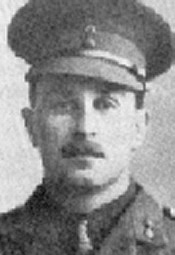Gerald Robert O'Sullivan facts for kids
Quick facts for kids
Gerald Robert O'Sullivan
|
|
|---|---|
 |
|
| Born | 8 November 1888 Frankfield, Douglas, County Cork |
| Died | 21 August 1915 (aged 26) Scimitar Hill, Gallipoli, Ottoman Turkey |
| Buried |
Remembered on the Helles Memorial
|
| Allegiance | United Kingdom |
| Service/ |
British Army |
| Years of service | 1909–1915 † |
| Rank | Captain |
| Unit | 1st Battalion, The Royal Inniskilling Fusiliers |
| Battles/wars | First World War
|
| Awards | Victoria Cross |
Gerald Robert O'Sullivan (born November 8, 1888 – died August 21, 1915) was a brave Irish soldier. He received the Victoria Cross, which is the highest award for bravery in battle given to soldiers from Britain and Commonwealth countries. It's given for showing amazing courage when facing the enemy.
Contents
Early Life and Military Training
Gerald Robert O'Sullivan was born in Frankfield, Douglas, in County Cork, Ireland. This was on November 8, 1888. His father was also a soldier.
Gerald, often called 'Jerry', went to Wimbledon College. After finishing school in 1906, he wanted to join the British Army. He then went to the Royal Military Academy at Sandhurst. This is a famous place where army officers are trained.
Joining the Army and First World War
In 1909, Gerald became an officer in the Royal Inniskilling Fusiliers. For about three years, he served with his unit in China. Later, his battalion moved to British India.
When the First World War started, his unit was called back to England. They were preparing to fight in a big campaign called the Gallipoli Campaign.
Fighting in Gallipoli
Gerald O'Sullivan was now a captain in the 1st Battalion. He led a group of soldiers during the landing at X Beach. This happened on the Gallipoli peninsula on April 25, 1915. He showed great skill in the early battles.
On June 18, 1915, enemy soldiers attacked nearby positions. The soldiers defending those spots had to leave them. Captain O'Sullivan quickly led his company in a counterattack. They fought hard to get the lost position back. It changed hands several times that day.
Finally, a senior officer told O'Sullivan to lead a group of soldiers to capture the position. They succeeded at dawn the next day.
Awarded the Victoria Cross
Two weeks later, Captain O'Sullivan was involved in another brave action. This was near a place called Krithia. Because of his actions, he was recommended for the Victoria Cross (VC).
The official report about his bravery was published on September 1, 1915. It said:
For most conspicuous bravery during operations south-west of Krithia on the Gallipoli Peninsula. On the night of 1st–2nd July, 1915, when it was essential that a portion of a trench which had been lost should be regained, Captain O'Sullivan, although not belonging to the troops at this point volunteered to lead a party of bomb throwers to effect the recapture. He advanced in the open under a very heavy fire and in order to throw his bombs with greater effect, got up on the parapet, where he was completely exposed to the fire of the enemy occupying the trench. He was finally wounded, but not before his inspiring example had led his party to make further efforts, which resulted in the recapture of the trench. On the night of 18th–19th June, 1915, Captain O'Sullivan had saved a critical situation in the same locality by his personal gallantry and good leading.
This means he showed amazing bravery. He volunteered to lead a group to take back a lost trench. He moved forward under heavy enemy fire. To throw his bombs better, he stood up where the enemy could see him easily. He was wounded, but his courage inspired his team. They managed to recapture the trench. The report also mentioned his bravery on June 18-19, 1915.
Return to Battle and Death
The wounds he got on July 1-2 meant he had to go to Egypt for medical care. But he recovered quickly. He returned to his unit on August 11, 1915.
His division was now at Suvla Bay. They were getting ready for a new attack. The Inniskillings were given the task of capturing a place called Hill 70, also known as Scimitar Hill. During this battle, on August 21, 1915, Captain O'Sullivan led a charge of 50 men towards the hilltop. Sadly, he was killed during this charge.
Gerald O'Sullivan does not have a known grave. He is remembered on the Helles Memorial to the Missing. This memorial honors soldiers who died in Gallipoli and have no known burial place. His Victoria Cross was given to his mother. His name is also on a memorial in Dorchester, where his mother lived.
 | Audre Lorde |
 | John Berry Meachum |
 | Ferdinand Lee Barnett |

